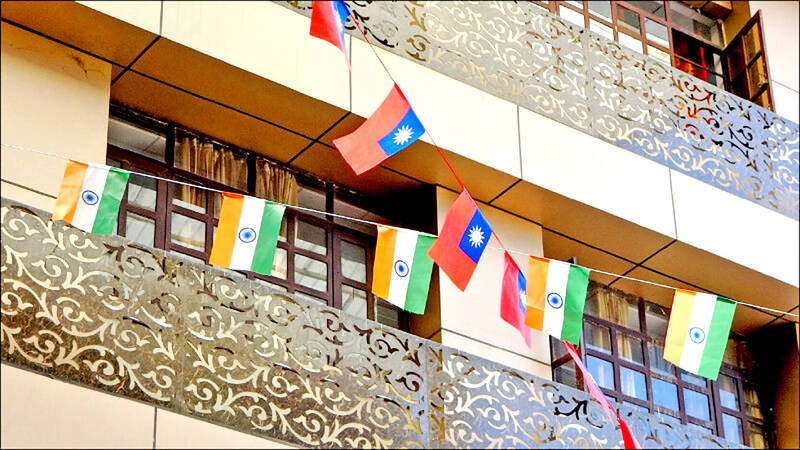《TAIPEI TIMES》 Group joins war games in India

Strings of the flags of Taiwan and India are pictured at a school in New Delhi in an undated photograph. Photo: CNA
TABLETOP EXERCISES: In the final discussion of the war games, participants were asked to mull the perspective, policy and interests of the state they were simulating
By Jonathan Chin / Staff writer, CNA
Taiwanese and Indian think tanks last month held a tabletop exercise in India simulating the potential effect of tensions in the Taiwan Strait on the Sino-Indian border, the Institute for National Defense and Security Research said on Friday.
The institute and the New Delhi-based United Service Institution of India, with the assistance of US academics, conducted a war game called the Taiwan, US and India Trilateral Joint Military Simulation Workshop, it said.
Designed mainly by the Indian institute, the exercise focused on India’s geopolitical posture in 2035, the link between the Taiwan Strait and the contested Sino-Indian border and likely responses to potential developments in the US, West Asia, Southeast Asia, Central Asia and Europe, it said.
Russia, ASEAN and central and western Asian nations’ roles in the simulation were played by retired Indian diplomats, guided by the policy and objectives that their governments are believed would pursue, the Taipei-based institute said.
Retired officers of the Indian armed forces also took part in the exercise, it added.
United Service Institution director B.K. Sharma, a retired Indian Army major general, headed the final discussion of the war game and urged participants to be aware of the perspective, policy and interests of the government they were simulating, it said.
The tabletop exercises took place during a visit by a delegation from Taiwan consisting of Institute for National Defense and Security Research acting deputy chief executive officer Shen Ming-shih (沈明室), and researchers Lee Che-chuan (李哲全), Shih Chien-yu (侍建宇) and Tseng Yi-shuo (曾怡碩).
The exercise differed from US-held war games, as it focused more on actors other than the major powers and the diplomatic reaction from third parties, Shen said yesterday.
The joint war games have the potential to be a template for more exercises, he said.
Asked about Beijing’s protest to New Delhi after Indian Prime Minister Narendra Modi responded to a congratulatory message on his election victory by President William Lai (賴清德), Shen said that China’s “canned responses” are to be expected.
What was more interesting was Modi’s remark that he “looks forward to closer ties” between Taiwan and India in a “mutually beneficial economic and technological partnership,” as it hinted at greater bilateral cooperation, Shen said.
Although Modi’s ruling Bharatiya Janata Party did not win a majority of parliament seats and had to form a coalition government, signs were good that Indian Minister of External Affairs Subrahmanyam Jaishankar and Indian Minister of Defence Rajnath Singh would keep their positions, he said.
That would mean that India’s defense and foreign affairs stance on Taiwan would carry over in the new Cabinet, providing continuity in the two nation’s relationship, he added.
新聞來源:TAIPEI TIMES



















